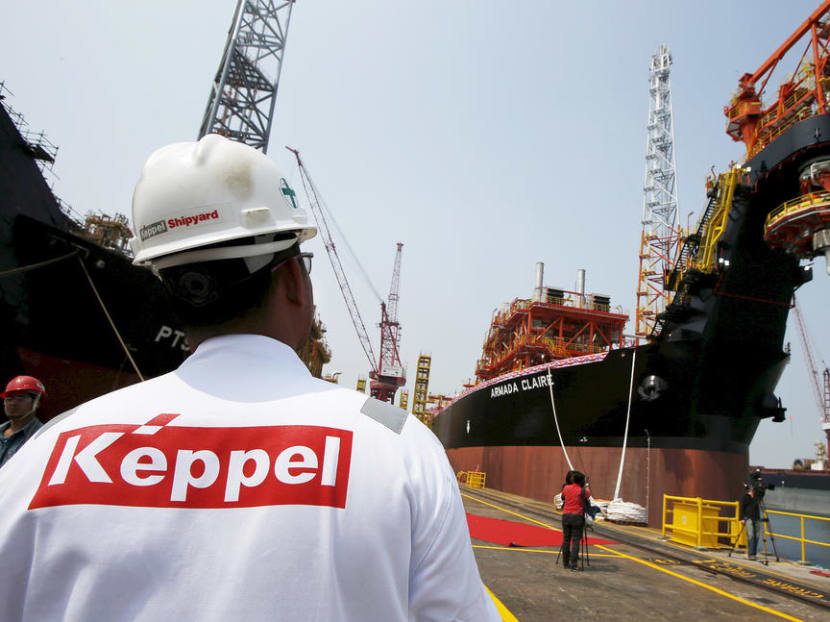Keppel unit paid heavy price for bribery scandal: Indranee
SINGAPORE — Stressing that Keppel Offshore & Marine (KOM) has not gotten away lightly for an international bribery scandal, Senior Minister of State (Finance and Law) Indranee Rajah on Monday (Jan 8) explained to the House why the Singapore authorities issued a conditional warning to the company.
SINGAPORE — Stressing that Keppel Offshore & Marine (KOM) has not gotten away lightly for an international bribery scandal, Senior Minister of State (Finance and Law) Indranee Rajah on Monday (Jan 8) explained to the House why the Singapore authorities issued a conditional warning to the company.
Among other reasons, the firm — which is a unit of government-linked company Keppel Corp — had volunteered its internal findings to the Corrupt Practices Investigation Bureau (CPIB) and Attorney-General’s Chambers on the matter in September 2016. It also cooperated with the three jurisdictions involved, United States, Brazil and Singapore, Ms Indranee said.
She added that United States’ Department of Justice had entered into a deferred prosecution agreement (DPA) with KOM, which said that it will “voluntarily agree” to the US DPA and the Brazilian leniency agreement.
The Singapore authorities also took into account the fact that “the key elements of this case, in particular the recipients of the bribes and the projects connected with the bribes, occurred outside Singapore”, and the jurisdictions concerned are also acting against the company, Ms Indranee said.
A conditional warning, she explained, allows Singapore to impose on KOM the conditions that are “closely aligned” to the terms of the US DPA. If any of the conditions are breached, KOM can be prosecuted. Under the US DPA, KOM is required to strengthen its internal controls, compliance and anti-corruption programmes.
The “aligned approach” results in a robust resolution to the case, Ms Indranee said.
On Dec 23, KOM said in a press statement that under the US DPA, it has agreed to pay US$422 million (S$570 million) in fines as part of global resolution with authorities in Singapore, Brazil and the United States. The US Justice Department said that from 2001 to 2014, KOM had engaged in a scheme to pay US$55 million in bribes to win contracts. KOM will pay about US$105.6 million to the United States (US), including a US$4.7 million criminal fine paid by Keppel O&M USA. Brazil will receive US$211.1 million or 50 per cent of the total criminal penalty.
Singapore will receive US$105.6 million or 25 per cent, with half of the payment subject to any “further penalties” which the Brazilian authorities may impose.
WP chairman and Aljunied GRC MP Sylvia Lim asked for the Government’s response to a perception that KOM got away with “lenient treatment” and a “slap on the wrist”. Ms Indranee said that as far as the company is concerned, it was a “heavy price to pay” given that the total penalty was almost eight times the bribes which the KOM paid.
The maximum fine under the Prevention of Corruption Act is S$100,000 per charge, so this “wouldn’t get us anywhere near the penalty under the global resolution or even Singapore’s share of the current penalty”, Ms Indranee said. “Under the global resolution, what it means essentially, is that we are able to achieve all the things that we would have been able to do with prosecution but even more,” she said.
Ms Indranee also responded to Ms Lim’s question about whether the penalty to be paid by KOM was part of a three-nation plea bargain agreement involving the respective countries and Keppel companies. It was not a plea bargain, and each jurisdiction worked under its domestic laws while working with the other two countries to reach a global resolution, Ms Indranee said.
Ms Lim’s fellow WP MPs, Aljunied GRC MP Pritam Singh and Hougang MP Png Eng Huat, wanted to know whether any action will be taken against the individuals involved, and were there any conditions that prevent the public disclosure of the identities of the Singaporeans involved.
Ms Indranee replied: “For criminal investigations, it is standard practice in Singapore, and in many other jurisdictions, not to identify individuals under investigation.”
She pointed out that investigations may sometimes lead to no offences made out or that prosecution is unwarranted, “in which case disclosure would have been prejudicial to the individual concerned”.
She said: “Individuals will be identified if and when charges are preferred in Court.”
Ms Indranee said she was unable to put a timeline on the investigation by the Singapore authorities, given that this is an international case. “Obviously the intention is to move as expeditiously as possible. However… not all aspects of the investigation are within our control,” she said.
The case involves many projects in Brazil and goes back all the way to 2001, she noted. Most of the evidence, including documents and witnesses, are located in different jurisdictions, including Brazil and the US, she said.
The AGC has asked for certain information from the foreign authorities, and some of the requests are still pending. It expects to make further requests as the investigation develops. It is only after the probe is completed when the AGC can assess the case properly and decide on the “appropriate response”, Ms Indranee said.
She added: “How the Public Prosecutor decides will depend on several factors, including the culpability of each individual, the available evidence and what is appropriate in the circumstances.”







